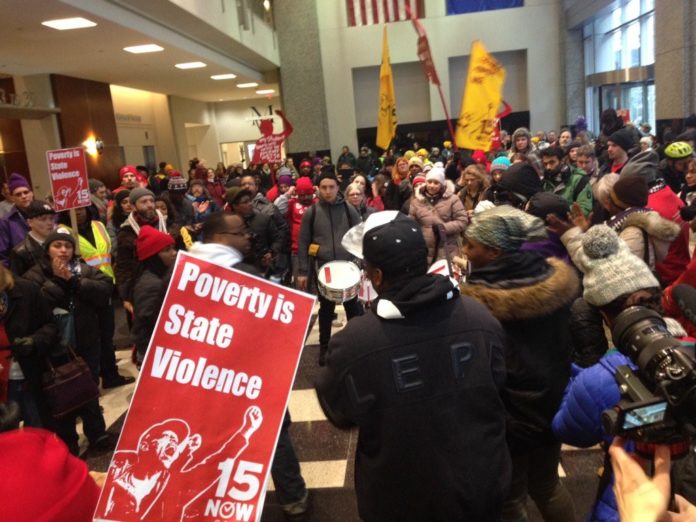With last week’s protests for a $15 dollar minimum wage and increased pressure being put on Minnesota legislators to enact change, many are asking what the economic effects will be of a $15 dollar minimum wage. To get a clear picture of what a drastically increased minimum wage in Minnesota (from $7.25 for small companies and $9.00 for large companies, to $15 per hour for all companies) would do to the economy, it is necessary to study how it would affect unemployment, inflation, and product prices.
In December of 2015 the state of Minnesota boasted a 3.5% unemployment rate, the nation’s fourth strongest rate. In addition, 70% of the labor force was employed, the nation’s fourth best labor participation rate. By these numbers Minnesota’s economy is strong, but it is clear that a drastic minimum wage hike would harm Minnesota’s strong economy and employment prospects for a few different reasons.
America functions in a capitalist system, whereby supply and demand serve as the backbone to the national and state economies. Supply and demand controls labor as well. Harry Holzer, a Nonresident Senior Fellow in Economics at the Brookings Institute wrote, “Many employers will be very reluctant to pay high wages to workers with modest skills.” Minimum wage positions are historically for individuals with minimum skills; as one gains more skills they are able to earn more money in a free and voluntary capitalist system. Holzer goes onto argue that “Many economists worry minimum wage increases tend to reduce employment, hurting young and less-educated workers the most” and also adding that “moderate minimum wage increases will lead to modest job losses.”
An increase of at least $6 dollars in the Minnesota minimum wage is not a moderate increase, and therefore it can be implied that it will not lead to modest job losses, but rather large scale job losses. A study published in the Industrial and Labor Relations Journal found that any 10% increase in the minimum wage will foster a 1-2% decrease in employment for teens, and 1.5-2.5% decrease in employment for young adults. According to Governing Magazine, 11% of young people ages 16-24 are unemployed, and a dazzling 18.6% of individuals ages 16-19 are unemployed. Young people tend to work minimum wage jobs, and therefore it can be inferred that young people will be harmed by an increase in the minimum wage. Their ability to find a job and play a role in the Minnesota economy will suffer.
Yet another problem with an increase in the minimum wage is that some economists worry it would increase inflation. As inflation increases, the purchasing power of the individual decreases, and the value of money decreases. Investopedia argues “raising the minimum wage to an excessively high rate would exert inflationary pressure on the economy.” Economists who abide by this theory argue that the act of artificially inflating a wage drastically results in the value of money to decrease, thereby creating inflation.
In addition to harming employment prospects, a minimum wage hike to $15 per hour would increase prices. A study done by researchers at Purdue University found that restaurants that increase wages to $15 per hour will see a roughly 4.3% increase in prices. Low prices benefit lower-class Americans. Making individuals pay more for goods and services hurts individuals and families. Part of what is uniquely American is the ability to pay little for high quality goods, which has been created by a globalized economy dictated by free-trade and capitalist principles.
Understanding the effects of the $15 minimum wage is important, but so is understanding the historical significance of such a massive increase in the minimum wage. A large increase would be unprecedented, given that the federal government has never increased the minimum wage more than a dollar at one point in time, and no state has a minimum wage above $10.50. Will a $15 minimum wage ever come to fruition at the state or federal level? Only time will tell. To stay updated on the issue, make sure to subscribe to Alpha News.











